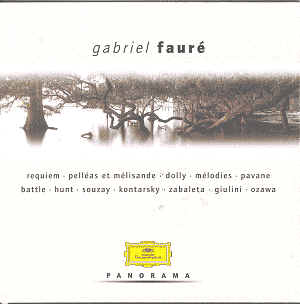Gabriel FAURÉ
Requiem (a)
Pelléas et Mélisande (b)
Une chatelaine en sa tour (c)
Pavane (d)
Dolly (e)
3 Mélodies (f)
L'Horizon chimérique (f)
Après un rêve (g)
Elégie (g)
Nocturne No. 4 (h)
Barcarolle No. 2 (h)
Masques et bergamasques (i)
Cantique de Jean Racine (j) |
 |
 (a) Kathleen
Battle, Andreas Schmidt - Philharmonia Chorus and Orchestra - Carlo Maria
Giulini (a) Kathleen
Battle, Andreas Schmidt - Philharmonia Chorus and Orchestra - Carlo Maria
Giulini
(b) Lorraine Hunt, Boston Symphony Orchestra - Seiji Ozawa
(c) Nicanor Zabaleta
(d) Tanglewood Festival Chorus, Boston Symphony Orchestra, Seiji Ozawa
(e) Alphonse and Aloys Kontarsky
(f) Gérard Souzay, Dalton Baldwin
(g) Jules Eskin - Boston Symphony Orchestra - Seiji Ozawa
(h) Pascal Rogé
(i) Orpheus Chamber Orchestra
(j) Kings College Choir, Stephen Cleobury
recorded 1964 (c), 1983 (e), 1986 (a), 1987 (b, d, g), 1990 (h) 1996 (i),
1998 (j).
 DG 469 268-2
[148.50] (Panorama series) 2
CDs DG 469 268-2
[148.50] (Panorama series) 2
CDs
Crotchet
AmazonUK
AmazonUS |
This compendium of popular works by Fauré will find a welcome home
in many collections.
The main two recordings, which make up the bulk of this reissue are the Giulini
Requiem, and the Ozawa collection made from most of his full price disc.
Added to these are a few other works, which enhance the general value of
this release, although keen collectors may already have some of these items.
The first and main work on the disc is the Giulini Requiem with Kathleen
Battle, Andreas Schmidt, and the Philharmonia Chorus and Orchestra. This
is a beautifully played and recorded performance but will not suit you if
you are into modern playing practices. This is a performance of the old school
- slow, (very slow), romantic, lush and very reverential. You may think that
slow and lush means slushy, but this is certainly not the case, and I found
it very moving. The two soloists are totally with Giulini in his interpretation
and there is a very attractive unity about the whole work. I warn you, however,
if you like current performance practices of lean forces and sprightly tempi,
you may not find this very appealing.
The rest of this issue is not nearly so controversial. The bulk of the remaining
items are from an issue which has been in the catalogue for a number of years
at full price and still is, (as is the Giulini Requiem). This is an orchestral
anthology of which all has been included here (except the Dolly Suite).
Ozawa is not much in vogue at present, but make no mistake, his performances
of Fauré are excellent. (Remember the old saying that the Boston Symphony
Orchestra was the best French orchestra in the world). He is joined by Lorraine
Hunt for the rarely performed vocal items within Pelléas et
Mélisande, the Tanglewood Festival Chorus for the Pavane,
and Jules Eskin for the Elégie and Après un
rêve. Why the Dolly Suite was substituted by the version
for two pianos is a mystery. Maybe it was done to provide a bit of variety.
No matter, the piano version is very welcome.
In addition to the two piano version of Dolly Suite we also have a
solo for harp, ably played by Nicanor Zabaleta.
Masques et Bergamasques is added to the set from another source, as
it was not on the Ozawa issue first time around. This is by the Orpheus Chamber
Orchestra and it comes from a short anthology which is the most recent recording
in this set. Modern performance practice is to the front, and it sounds somewhat
out of place in this anthology. Nevertheless it is beautifully played and
recorded by this conductorless ensemble.
Universal have added some of the smaller items from Philips, namely two small
song cycles, wonderfully performed by that doyen of French song, Gérard
Souzay, ably accompanied by Dalton Baldwin.
Decca has also provided two piano solos played by Pascal Rogé, and
the final item on the set (Cantique de Jean Racine) also sounds a
little out of place, sung by the Choir of King's College, Cambridge conducted
by their choirmaster Stephen Cleobury. Another first class performance in
the well known acoustic, but not sounding very French.
To sum up then, a very interesting issue which should give much pleasure,
and more than that, to fans of the Requiem who haven't heard this unusual
but nevertheless very moving interpretation of the work. It gives a very
good thumbnail sketch of the output of Fauré and should be enjoyed
by many who buy it.
John Phillips

